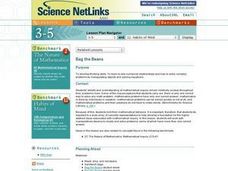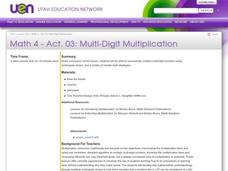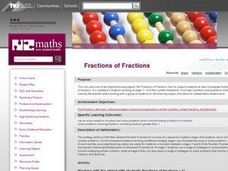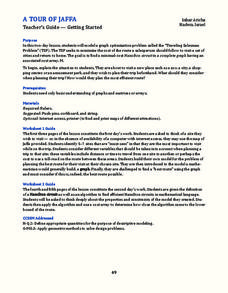Teach Engineering
Solar Angles and Tracking Systems
The sun will continue to rise in the east and set in the west, no matter what. The first lesson plan in a series of eight introduces the class to solar angles. It makes connections between a person's latitude and the angle of position of...
Curated OER
Bag the Beans
Students are exposed to a wide array of concrete representations to help develop a foundation for the higher abstract ideas associated with mathematical inquiry. In this lesson, students will work with manipulatives (beans) to create and...
Curated OER
Multiplication Versus Addition
Second graders create arrays to study multiplication. In this multiplication lesson, 2nd graders split into teams to complete a multiplication table. One team uses addition to solve the table while the other uses multiplication. Students...
Pennsylvania Department of Education
Equal Groups
Students explore statistics by completing a graphing activity. In this data analysis activity, students define a list of mathematical vocabulary terms before unpacking a box of raisins. Students utilize the raisins to plot data on a line...
Curated OER
Area Model of Multiplication
Fifth graders build area models to represent multi-digit multiplication. This lesson is not complete, but having pupils learn first through hands-on experiences builds a solid mathematical foundation.
Curated OER
Associative Property of Multiplication
Third graders discover the associative property of multiplication. In this multiplication instructional activity, 3rd graders explore visual examples of using the commutative and associative properties of multiplication. They also...
Savvas Learning
Saxon Math 5/4
You'll never have to search for another worksheet again after downloading this extensive collection of Saxon math materials. With over 600 pages of example problems and skills practice exercises, this is a must-have resource...
Curated OER
Relating Multiplication and Division
Students use counters to review arrays and multiplication and learn arrays and division. In this multiplication and division lesson, students use counters to arrange multiplication equations and division equations.
Curated OER
Multi-Digit Multiplication
Fourth graders practice mastering the ability to multiply multi-digit numbers utilizing rectangular arrays and a variety of mental math strategies. They model and illustrate meanings of multiplication and division of whole numbers and...
Curated OER
Bag the Beans
Students work in pairs to sort several beans into different piles according to a rule they make up. They use manipulatives to solve complex mathematical problems.
Curated OER
Fractions of Fractions
Fourth graders use an online tool entitled the "Fraction of Fractions" tool to examine how to find a fraction of a fraction. They apply the array tool to problem solving situations. They complete paper folding activities in which they...
Curated OER
Multiplying Three Numbers
In this multiplying three numbers worksheet, learners, working with a partner, problem solve and calculate the answers to eighteen word problems or mathematical equations involving multiplication.
Curated OER
A Polynomial Quilt
Tenth graders create polynomial quilts. In this polynomials lesson plan, 10th graders use concrete models, such as construction paper, to create various shapes described. Students use the FOIL method to multiply terms and to get a square...
Curated OER
Partial Products
Students use the partial products algorithm to complete multiplication problems. In this partial products lesson plan, students are introduced to the algorithm and connect the relationship to multiplication and division problems.
Curated OER
Distribution Property Of Multiplication Over Addition
Fourth graders complete problems where they demonstrate their knowledge of the distributive property of multiplication. In this distributive property lesson plan, 4th graders are provided with worksheets.
Curated OER
the Squares of Numbers in Multiplication
Learners memorize the multiplication math facts and learn many different ways of visualizing and practicing the multiplication concepts. They begin practicing with arrays, skip counting, and moving manipulatives for the 0, 1, 2, 3, and 4.
Curated OER
You Can Count on Squares!
Fourth graders engage in and explore to develop mathematical, specifically algebraic, ideas. Although the tasks are built around measurement, they are algebraic to the extent that they require 'formulae' to be derived form the geometric...
Curated OER
Number in Geometry
Students use a number line to assist with their additions. They use a calculator to check for factors. Students are taught factors and multiples. They use array model of multiplication to define meaning. Students develop a wide range of...
Curated OER
Multiplication Facts for 2,5, and 10
Students practice multiplying by 2, 5 and 10. In this multiplication lesson, students participate in a teacher demonstration lesson of grouping for multiplication or making arrays. They concentrate on two's in this lesson and apply what...
Curated OER
A Tour of Jaffa
Use the age-old Traveling Salesman Problem to introduce Hamilton circuits to your young travelers. Individuals then plan an efficient route to visit all the places they want to go.
EngageNY
The Distributive Property and the Products of Decimals
Make multiplication of decimals easier by applying the distributive property. Pupils investigate how they can use the distributive property to multiply decimals. After learning the strategy, they work on some practice problems at...
EngageNY
Interpreting Division of a Whole Number by a Fraction—Visual Models
Connect division with multiplication through the use of models. Groups solve problems involving the division of a whole number by a fraction using models. The groups share their methods along with the corresponding division and...
Curated OER
Rows of Numbers
Students generate patterns from a structured situation, find a rule for the general term, and express it in words and symbols. They also devise and use problem solving strategies in a systematic way.
Curated OER
Brian's Pegboard II
Young scholars are able to assess a problem and use systematic methods to solve the problem. They also find out all the possible outcomes for a sequence of events using tree diagrams.























